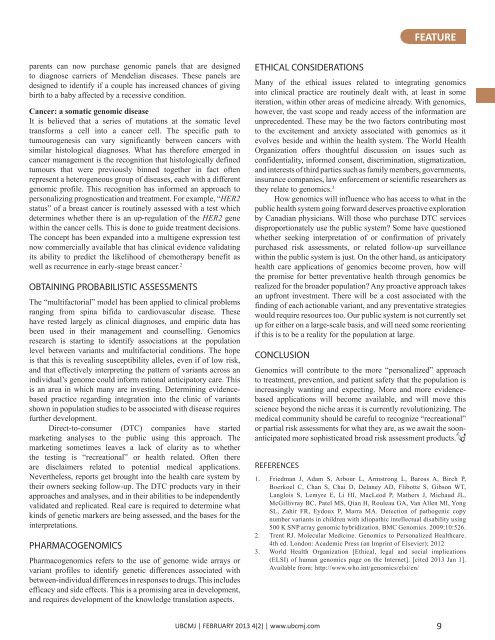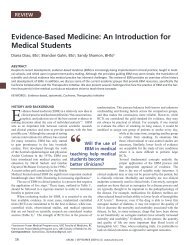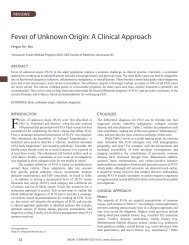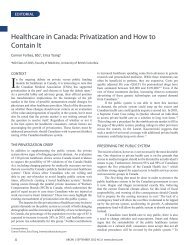Download full PDF - UBC Medical Journal
Download full PDF - UBC Medical Journal
Download full PDF - UBC Medical Journal
You also want an ePaper? Increase the reach of your titles
YUMPU automatically turns print PDFs into web optimized ePapers that Google loves.
FEATURE<br />
parents can now purchase genomic panels that are designed<br />
to diagnose carriers of Mendelian diseases. These panels are<br />
designed to identify if a couple has increased chances of giving<br />
birth to a baby affected by a recessive condition.<br />
Cancer: a somatic genomic disease<br />
It is believed that a series of mutations at the somatic level<br />
transforms a cell into a cancer cell. The specific path to<br />
tumourogenesis can vary significantly between cancers with<br />
similar histological diagnoses. What has therefore emerged in<br />
cancer management is the recognition that histologically defined<br />
tumours that were previously binned together in fact often<br />
represent a heterogeneous group of diseases, each with a different<br />
genomic profile. This recognition has informed an approach to<br />
personalizing prognostication and treatment. For example, “HER2<br />
status” of a breast cancer is routinely assessed with a test which<br />
determines whether there is an up-regulation of the HER2 gene<br />
within the cancer cells. This is done to guide treatment decisions.<br />
The concept has been expanded into a multigene expression test<br />
now commercially available that has clinical evidence validating<br />
its ability to predict the likelihood of chemotherapy benefit as<br />
well as recurrence in early-stage breast cancer. 2<br />
OBTAINING PROBABILISTIC ASSESSMENTS<br />
The “multifactorial” model has been applied to clinical problems<br />
ranging from spina bifida to cardiovascular disease. These<br />
have rested largely as clinical diagnoses, and empiric data has<br />
been used in their management and counselling. Genomics<br />
research is starting to identify associations at the population<br />
level between variants and multifactorial conditions. The hope<br />
is that this is revealing susceptibility alleles, even if of low risk,<br />
and that effectively interpreting the pattern of variants across an<br />
individual’s genome could inform rational anticipatory care. This<br />
is an area in which many are investing. Determining evidencebased<br />
practice regarding integration into the clinic of variants<br />
shown in population studies to be associated with disease requires<br />
further development.<br />
Direct-to-consumer (DTC) companies have started<br />
marketing analyses to the public using this approach. The<br />
marketing sometimes leaves a lack of clarity as to whether<br />
the testing is “recreational” or health related. Often there<br />
are disclaimers related to potential medical applications.<br />
Nevertheless, reports get brought into the health care system by<br />
their owners seeking follow-up. The DTC products vary in their<br />
approaches and analyses, and in their abilities to be independently<br />
validated and replicated. Real care is required to determine what<br />
kinds of genetic markers are being assessed, and the bases for the<br />
interpretations.<br />
PHARMACOGENOMICS<br />
Pharmacogenomics refers to the use of genome wide arrays or<br />
variant profiles to identify genetic differences associated with<br />
between-individual differences in responses to drugs. This includes<br />
efficacy and side effects. This is a promising area in development,<br />
and requires development of the knowledge translation aspects.<br />
ETHICAL CONSIDERATIONS<br />
Many of the ethical issues related to integrating genomics<br />
into clinical practice are routinely dealt with, at least in some<br />
iteration, within other areas of medicine already. With genomics,<br />
however, the vast scope and ready access of the information are<br />
unprecedented. These may be the two factors contributing most<br />
to the excitement and anxiety associated with genomics as it<br />
evolves beside and within the health system. The World Health<br />
Organization offers thoughtful discussion on issues such as<br />
confidentiality, informed consent, discrimination, stigmatization,<br />
and interests of third parties such as family members, governments,<br />
insurance companies, law enforcement or scientific researchers as<br />
they relate to genomics. 3<br />
How genomics will influence who has access to what in the<br />
public health system going forward deserves proactive exploration<br />
by Canadian physicians. Will those who purchase DTC services<br />
disproportionately use the public system Some have questioned<br />
whether seeking interpretation of or confirmation of privately<br />
purchased risk assessments, or related follow-up surveillance<br />
within the public system is just. On the other hand, as anticipatory<br />
health care applications of genomics become proven, how will<br />
the promise for better preventative health through genomics be<br />
realized for the broader population Any proactive approach takes<br />
an upfront investment. There will be a cost associated with the<br />
finding of each actionable variant, and any preventative strategies<br />
would require resources too. Our public system is not currently set<br />
up for either on a large-scale basis, and will need some reorienting<br />
if this is to be a reality for the population at large.<br />
CONCLUSION<br />
Genomics will contribute to the more “personalized” approach<br />
to treatment, prevention, and patient safety that the population is<br />
increasingly wanting and expecting. More and more evidencebased<br />
applications will become available, and will move this<br />
science beyond the niche areas it is currently revolutionizing. The<br />
medical community should be careful to recognize “recreational”<br />
or partial risk assessments for what they are, as we await the soonanticipated<br />
more sophisticated broad risk assessment products.<br />
REFERENCES<br />
1. Friedman J, Adam S, Arbour L, Armstrong L, Baross A, Birch P,<br />
Boerkoel C, Chan S, Chai D, Delaney AD, Flibotte S, Gibson WT,<br />
Langlois S, Lemyre E, Li HI, MacLeod P, Mathers J, Michaud JL,<br />
McGillivray BC, Patel MS, Qian H, Rouleau GA, Van Allen MI, Yong<br />
SL, Zahir FR, Eydoux P, Marra MA. Detection of pathogenic copy<br />
number variants in children with idiopathic intellectual disability using<br />
500 K SNP array genomic hybridization. BMC Genomics. 2009;10:526.<br />
2. Trent RJ. Molecular Medicine. Genomics to Personalized Healthcare.<br />
4th ed. London: Academic Press (an Imprint of Elsevier); 2012<br />
3. World Health Organization [Ethical, legal and social implications<br />
(ELSI) of human genomics page on the Internet]. [cited 2013 Jan 1].<br />
Available from: http://www.who.int/genomics/elsi/en/<br />
<strong>UBC</strong>MJ | FEBRUARY 2013 4(2) | www.ubcmj.com<br />
9










